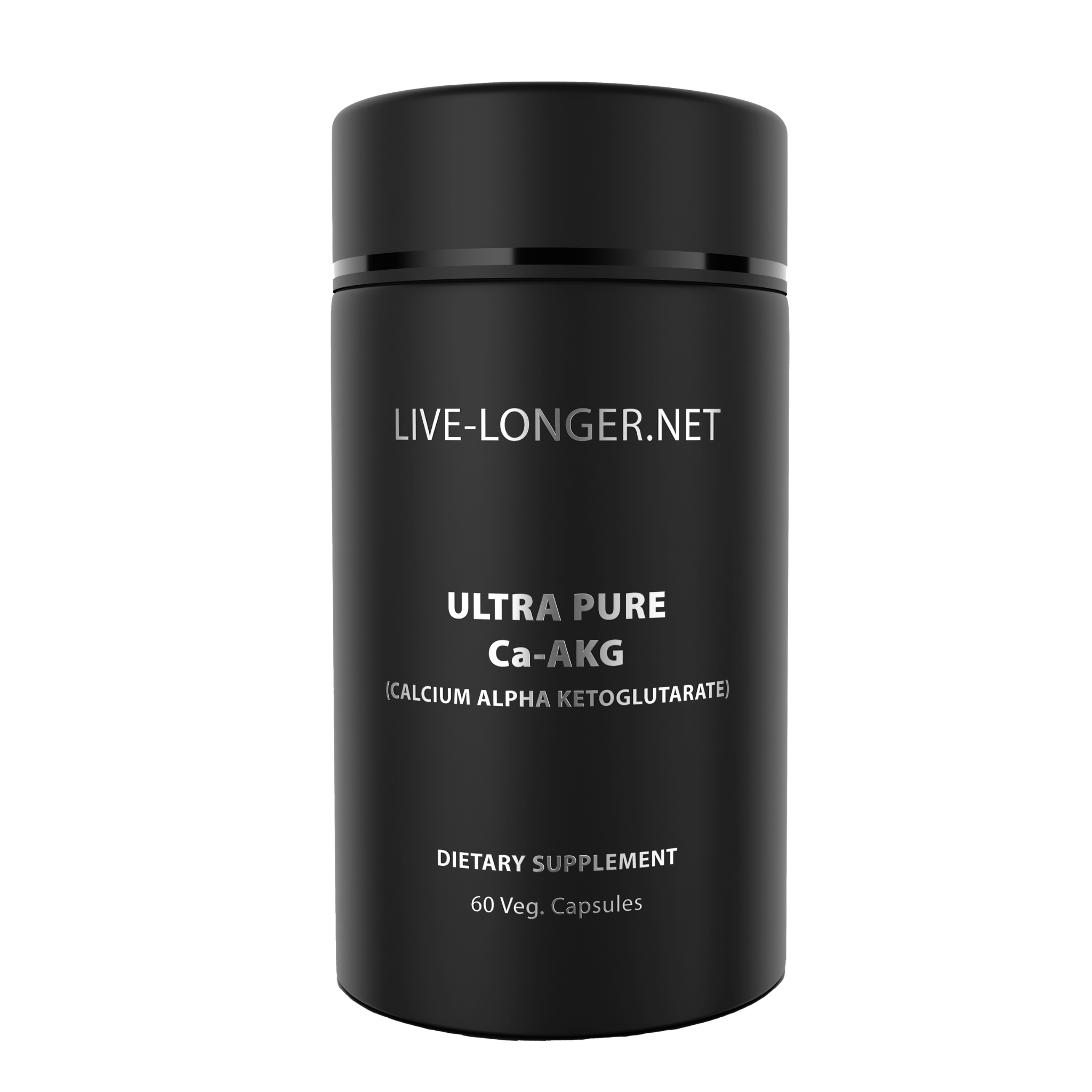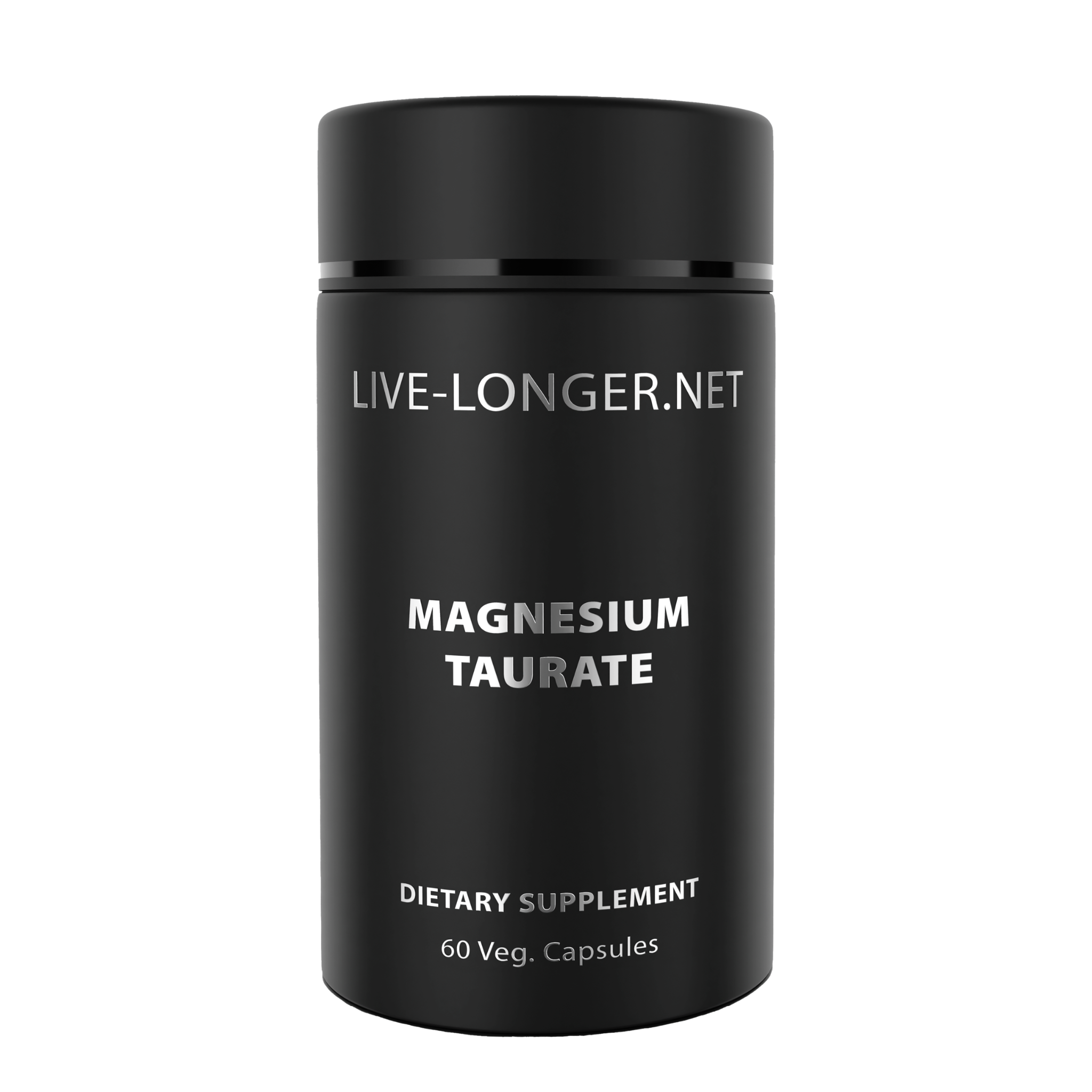Introduction
With the increasing age come problems like irregular heart rhythm, high blood pressure, imbalanced blood sugar levels, sudden fractures, and whatnot.
Can you imagine living in your 60s or 70s when you no longer have to worry about these problems?
Well, not just the imagination; you can live such a life! All you need is the proper nutrients in the correct dose. One such option is Magnesium Taurate supplements.
Studies indicate that not having enough magnesium for a long time speeds up the aging process of human cells, leading to diseases like osteoporosis, heart problems, high blood pressure, and certain cancers [1].
As people get older, they might not eat enough vitamins and minerals. For example, older people might not feel as hungry because their taste buds aren't as sharp. Some seniors might have trouble chewing or digesting food, which can stop them from getting enough nutrients.
That's where magnesium supplements come in handy. But why only magnesium taurate supplements? We will see it in the upcoming sections. We will also explore how they help with anti-aging and their various benefits.
What is Magnesium Taurate?
Magnesium taurate supplements contain a combination of the mineral magnesium and the amino acid taurine.
Taking magnesium taurate supplements is equal to taking magnesium and taurine separately. However, the combination form is preferred because it absorbs better and works efficiently.
What Do Magnesium And Taurine Do In Our Body?
Magnesium is super essential for your body. It helps with DNA synthesis, keeping your nerves and muscles working and supporting enzymes. Basically, a lot of what your body does needs magnesium. So, it's essential to get enough of it from your food.
Taurine is a special kind of amino acid. Unlike other amino acids that help build proteins, taurine has its unique job. Animal studies show that taurine deficiency can cause problems with the heart and immune system [2].
Why Do We Need Magnesium Taurate Supplements?
You may think, "Why do I need supplements?" "Why not eat magnesium through my diet?"
The problem with magnesium is that it's hard to get enough just from food. If you prefer processed foods, you're highly unlikely to get enough magnesium via food. Evidence says refining or processing the foods reduces the magnesium content by 80% [3].
Another problem is that magnesium is tricky for your body to absorb. According to the National Institutes of Health, your body can only absorb up to 30 to 40% of your dietary magnesium [4].
When picking a magnesium supplement, choose one that your body absorbs well. That way, you'll get the most out of it for your health.
Anti-aging Benefits of Magnesium Taurate Supplements
Here we come to the most crucial section of our article: the anti-aging benefits of magnesium taurate supplements.
Improves Heart Health
Taking care of your heart is crucial, especially in old age when you're surrounded by risk factors for cardiovascular problems.
A meta-analysis from 2015 shows that people with magnesium deficiency are more at risk of developing heart diseases [5].
Magnesium benefits the heart as it helps the heart muscles relax and makes it easier for blood vessels to carry blood to the heart. This effect becomes even stronger when combined with taurine, as both magnesium and taurine help with blood pressure and heart rhythm problems.
A 2018 study published in the Journal of Traditional and Complementary Medicine shows that magnesium taurate is a powerful antioxidant and maintains blood pressure [6].
Alleviates Blood Pressure
Magnesium taurate supplements help alleviate blood pressure levels and protect heart health. A study from Korea has also found an inverse relation between magnesium intake and high blood pressure, especially in obese women [7].
Controlling Blood Sugar Levels
Magnesium is essential for making energy and breaking down nutrients like carbs, protein, and fat.
It helps make insulin work better and fights inflammation and stress inside the body. Evidence shows that people with type 2 diabetes also have magnesium deficiency [8].
People in old age are more likely to have diabetes. Since people with diabetes often lack enough magnesium, taking it by mouth can be a good idea — for example, taking magnesium taurate supplements.
Improves sleep and anxiety
Did you know that not getting enough sleep can make you age earlier?
A study in 2013, sponsored by Estée Lauder, discovered that not getting enough sleep might make your skin age faster.
The study involved 60 women aged 30-49, who were checked visually and took part in some sleep tests. About half of these women didn't sleep well. Those who had poor sleep showed more signs of aging skin, like fine lines and uneven pigmentation, than those who slept better [9]. These findings suggest that your skin might age faster if you lack sleep.
If you're struggling with sleep or feeling anxious, taking magnesium taurate supplements is the best solution without using unnatural sleep aids. This mineral is vital for better sleep.
A randomized clinical trial has also confirmed the effectiveness of magnesium taurate for treating insomnia (difficulty falling asleep or staying asleep) and anxiety in the elderly population [10].
A chemical messenger in the brain called GABA helps us stay calm and fall asleep. Magnesium promotes the formation of GABA in the brain, thus allowing our brain to relax and promoting deep and restful sleep. GABA also helps produce melatonin, which tells our body it's time to sleep.
Improves Mood
The happier you are, the less likely you are to age. Depression and persistent stress give you dark circles, wrinkly eyes, and reduced gut health. Some studies suggest that having low levels of magnesium could be linked to feeling depressed [11]. Researchers are curious if taking magnesium supplements might help with this.
In a study lasting six weeks, people with depression were given 500 mg of magnesium each day. After just two weeks, they noticed their depression and anxiety symptoms getting better [12].
Another study, also lasting six weeks, involved 126 people with mild or moderate depression. They took 248 mg of magnesium daily along with their usual treatment. They reported feeling significantly better in terms of depression symptoms [13].
Ultimately, we need bigger, longer, and better-quality studies to understand how magnesium taurate supplements help treat insomnia and anxiety.
Helps With Migraines
Migraines mainly affect people between the ages of 20 and 40. Migraines are those really bad headaches that keep coming back. Having more magnesium might help with migraines.
In one study that lasted 12 weeks, people with migraines took a supplement with 600 mg of magnesium every day. They had 42% fewer migraine attacks, and the ones they did have weren't as bad [14].
Another review looked at five studies and found that taking 600 mg of magnesium, which is a lot, was safe and helpful for treating migraines [15].
Enhances Your Exercise Tolerance
Adding the amino acid taurine helps with quick recovery after workouts. Magnesium is essential for muscle function, allowing your body to recover after exercise.
It helps flush out waste from your body after exercising, making you feel like you have more energy and perform better while reducing muscle soreness.
A recent study found that taurine could help muscles recover after intense exercise in healthy men [16]
Prevents Type 2 Diabetes
Consuming more magnesium might lower your chances of getting type 2 diabetes, according to many studies. However, it needs to be clarified whether this is because of magnesium itself or because people who eat more magnesium also tend to eat less processed foods.
There has been less research on taurine, but early studies suggest it might help lower blood sugar by improving insulin. Taurine's antioxidant and anti-inflammatory properties could also help control blood sugar.
One review of five studies found that taking taurine supplements lowered hemoglobin A1C levels, which measures average blood sugar over three months, in 209 people with type 2 diabetes [17].
Is Magnesium Taurate the Best?
Is Magnesium Taurate right for you? Well, let's break it down. Magnesium taurate is excellent for people dealing with heart issues, tiredness, stress, or needing help with muscle recovery. It's also helpful for managing blood sugar and high blood pressure.
Why magnesium taurate? Why not other options?
Well, the thing is, whatever the source you choose for magnesium intake, only some of the ingested Mg will be absorbed. The comb form— magnesium taurate supplements get absorbed easily, so you get your magnesium.
Magnesium taurate is also an excellent option if you're an athlete looking for a more natural way to boost your energy and keep your nerves calm and muscles happy.
Conclusion
Magnesium taurate supplements help with energy production and keep your nerves in check and muscles working smoothly. Plus, these enable you to relax and chill out when you need it most.
To keep your magnesium levels steady, go for foods or supplements your body can absorb well. And most importantly, pick a supplement that fits your needs perfectly. Shop our all products to find the best options for maintaining your health.
References
- Qaradakhi, T., Gardiner, L. K., McSweeney, K. R., Abraham, J. R., Apostolopoulos, V., & Zulli, A. (2020). The Anti-Inflammatory Effect of Taurine on Cardiovascular Disease. Nutrients, 12(9), 2847.
- Swaminathan R. (2003). Magnesium metabolism and its disorders. The Clinical Biochemist. Reviews, 24(2), 47–66.
- U.S. Department of Health and Human Services. (n.d.). Office of dietary supplements - magnesium. NIH Office of Dietary Supplements.
- Wu, J., Xun, P., Tang, Q., Cai, W., & He, K. (2017). Circulating magnesium levels and incidence of coronary heart diseases, hypertension, and type 2 diabetes mellitus: a meta-analysis of prospective cohort studies. Nutrition journal, 16(1), 60.
- Shrivastava, P., Choudhary, R., Nirmalkar, U., Singh, A., Shree, J., Vishwakarma, P. K., & Bodakhe, S. H. (2018). Magnesium taurate attenuates the progression of hypertension and cardiotoxicity against cadmium chloride-induced hypertensive albino rats. Journal of traditional and complementary medicine, 9(2), 119–123.
- Choi, M. K., & Bae, Y. J. (2015). Association of Magnesium Intake with High Blood Pressure in Korean Adults: Korea National Health and Nutrition Examination Survey 2007-2009. PloS one, 10(6), e0130405.
- Barbagallo, M., & Dominguez, L. J. (2015). Magnesium and type 2 diabetes. World journal of diabetes, 6(10), 1152–1157.
- ScienceDaily. (2013, July 23). A study suggests that sleep deprivation is linked to aging skin. ScienceDaily.
- Abbasi, B., Kimiagar, M., Sadeghniiat, K., Shirazi, M. M., Hedayati, M., & Rashidkhani, B. (2012). The effect of magnesium supplementation on primary insomnia in elderly: A double-blind placebo-controlled clinical trial. Journal of Research in Medical Sciences: the official journal of Isfahan University of Medical Sciences, 17(12), 1161–1169.
- Serefko, A., Szopa, A., & Poleszak, E. (2016). Magnesium and depression. Magnesium Research, 29(3), 112–119.
- Barragán-Rodríguez, L., Rodríguez-Morán, M., & Guerrero-Romero, F. (2008). Efficacy and safety of oral magnesium supplementation in the treatment of depression in the elderly with type 2 diabetes: a randomized, equivalent trial. Magnesium research, 21(4), 218–223.
- Tarleton, E. K., Littenberg, B., MacLean, C. D., Kennedy, A. G., & Daley, C. (2017). Role of magnesium supplementation in treating depression: A randomized clinical trial. PloS one, 12(6), e0180067.
- Gaul, C., Diener, H. C., Danesch, U., & Migravent® Study Group (2015). Improvement of migraine symptoms with a proprietary supplement containing riboflavin, magnesium, and Q10: a randomized, placebo-controlled, double-blind, multicenter trial. The journal of headache and pain, 16, 516.
- von Luckner, A., & Riederer, F. (2018). Magnesium in Migraine Prophylaxis: There an Evidence-Based Rationale? A Systematic Review. Headache, 58(2), 199–209.
- McLeay, Y., Stannard, S., & Barnes, M. (2017). The Effect of Taurine on the Recovery from Eccentric Exercise-Induced Muscle Damage in Males. Antioxidants (Basel, Switzerland), 6(4), 79.
- Tao, X., Zhang, Z., Yang, Z., & Rao, B. (2022). The effects of taurine supplementation on diabetes mellitus in humans: A systematic review and meta-analysis. Food chemistry. Molecular sciences, 4, 100106.









